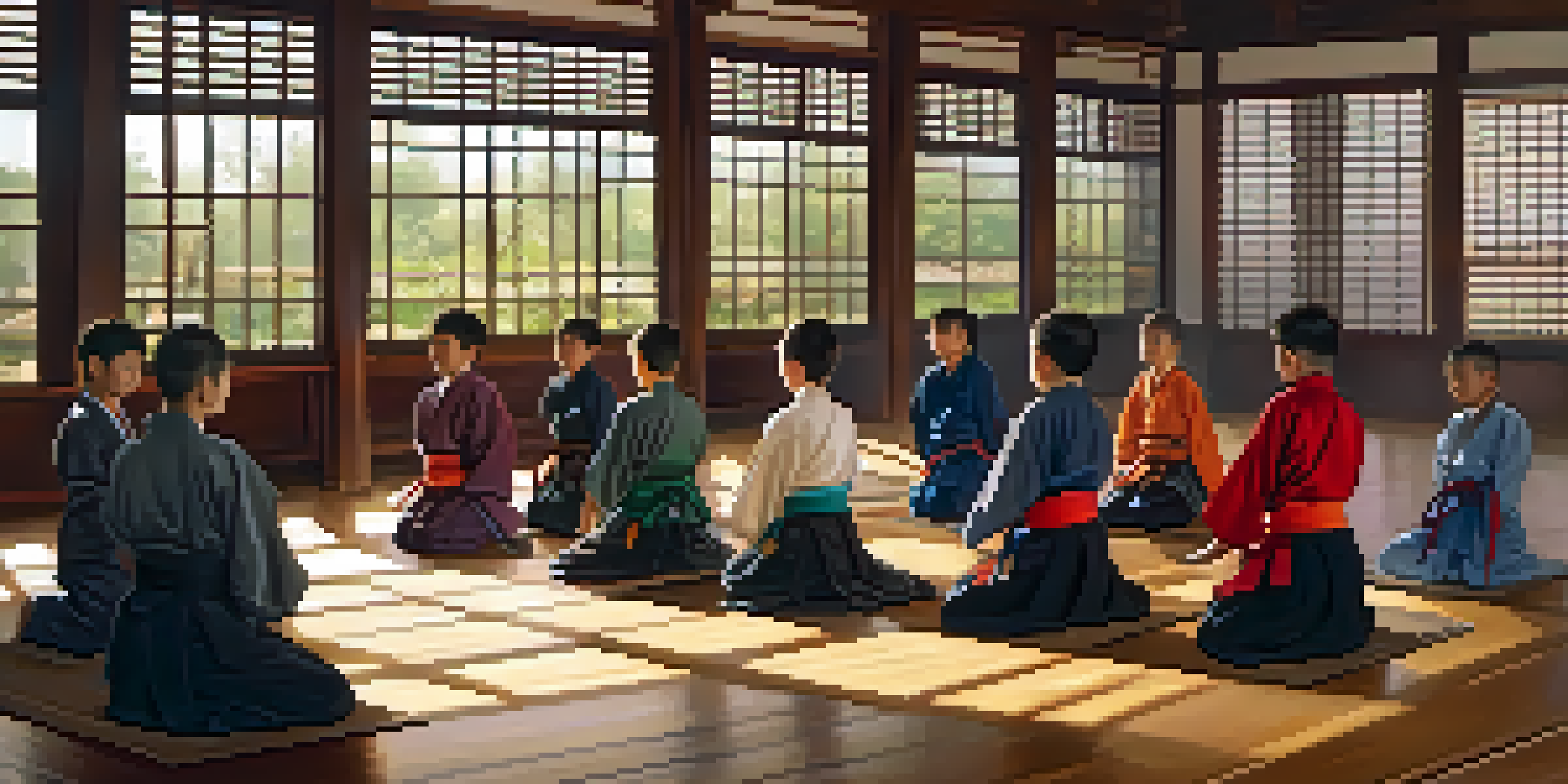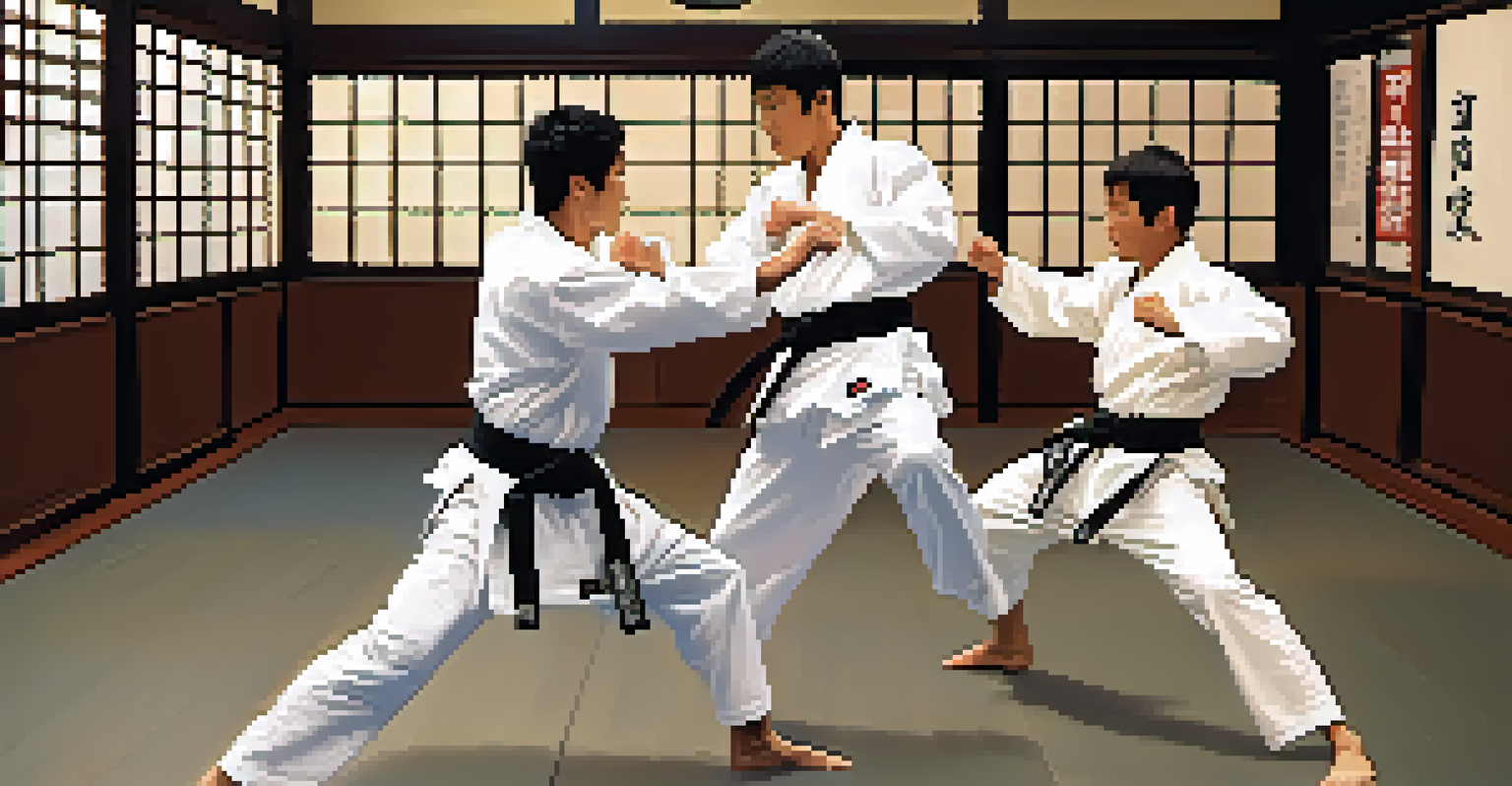Respect and Leadership: Core Values from Martial Arts Training

Understanding Respect in Martial Arts Training
Respect is a cornerstone of martial arts, emphasized from the very first lesson. Students bow to their instructors and peers, which serves as a reminder of the value placed on every individual in the dojo. This practice fosters a culture where respect is not just a word, but a behavior that students carry both inside and outside the training environment.
The ultimate aim of martial arts is not having to use them.
In martial arts, respect means acknowledging not only the skills of others but also their dedication and hard work. For example, a junior student learns to respect the higher belts not just for their skill but for the journey they have undertaken to reach that level. This understanding nurtures a sense of humility and appreciation, essential traits for personal growth.
Ultimately, the respect cultivated in martial arts helps create a supportive community. As students learn to support one another, they develop stronger bonds that enhance their training experience. This communal respect lays the groundwork for effective leadership, as it teaches individuals to uplift those around them.
Leadership Skills Developed through Martial Arts
Martial arts training is a powerful platform for developing leadership skills. As students progress, they often find themselves in roles where they must lead warm-ups, mentor younger students, or even assist instructors. These experiences help them build confidence and improve their communication skills, which are crucial elements of effective leadership.

In a typical class, leaders are not always the most skilled fighters; they are those who can motivate and inspire others. For instance, a student who encourages a friend to push through a challenging drill demonstrates leadership in action. This collaborative environment teaches that leadership is about empowering others rather than merely showcasing one's abilities.
Respect is Fundamental in Training
Respect in martial arts fosters a culture of humility and appreciation, benefiting personal growth both in and out of the dojo.
Moreover, martial arts often emphasize decision-making under pressure. Students learn to think quickly and make judicious choices during sparring sessions or competitions. This ability to remain calm and decisive can translate into real-world scenarios, enhancing their leadership capabilities in various situations.
Building Character Through Discipline
Discipline is a vital aspect of martial arts training that extends far beyond physical skills. Students must adhere to a rigorous training schedule, maintain focus during lessons, and practice consistently. This commitment to discipline shapes their character and instills a strong work ethic that can positively impact all areas of their lives.
Discipline is the bridge between goals and accomplishment.
For example, a student who dedicates time to perfect a particular technique learns the value of perseverance. This commitment teaches them that success comes from consistent effort, not just talent. As they face challenges in training, they develop resilience, an essential trait for effective leadership.
In essence, the discipline learned in martial arts becomes a guiding principle, helping students navigate life's challenges. This strong foundation allows them to lead by example, demonstrating that dedication and hard work can lead to success, both on and off the mat.
The Role of Humility in Martial Arts
Humility is a core value emphasized in martial arts training, often illustrated through the practice of bowing and acknowledging one’s instructors. This act is not just a formality; it reminds students that learning is a lifelong journey. Embracing humility encourages them to remain open to feedback and growth, essential qualities for effective leaders.
As students progress, they encounter more skilled practitioners, which can be humbling. This experience teaches them to respect the journey of others and recognize that everyone has their strengths and weaknesses. Acknowledging that there is always more to learn fosters a growth mindset, enabling them to lead with empathy and understanding.
Discipline Shapes Strong Character
The discipline learned through martial arts cultivates resilience and a strong work ethic, essential for effective leadership.
Ultimately, humility in martial arts fosters a culture of continuous improvement. Leaders who exhibit humility inspire those around them to embrace their journeys without fear of judgment, creating an environment where everyone can thrive.
Conflict Resolution Skills Through Sparring
Sparring is an integral part of martial arts training that teaches students how to handle conflict. Unlike in real-life confrontations, sparring takes place in a controlled environment, allowing students to practice techniques and strategies safely. This experience helps them develop critical thinking skills and the ability to remain calm under pressure.
For instance, during sparring sessions, students learn to read their opponent's movements and anticipate their next steps. This situational awareness is crucial in conflict resolution, as it enables individuals to navigate challenging interactions more effectively. By focusing on strategic thinking, they can find solutions rather than escalate tensions.
Moreover, sparring fosters respect between opponents. After a match, practitioners often acknowledge each other's skills and share feedback. This interaction reinforces the idea that conflict, when approached with respect and understanding, can lead to personal growth and improved leadership skills.
The Importance of Community in Martial Arts
Martial arts training thrives on community support, which plays a significant role in fostering respect and leadership. Students train together, share experiences, and encourage one another, creating a familial atmosphere. This sense of belonging is vital for personal development and contributes to a supportive learning environment.
As students work together to achieve common goals, they learn the importance of collaboration and teamwork. For example, during group drills or partner exercises, individuals must rely on each other to improve. This collaboration teaches them that effective leadership involves understanding and valuing the contributions of others.
Community Enhances Learning Experience
A supportive community in martial arts encourages collaboration and social responsibility, enriching the overall training journey.
Additionally, community in martial arts extends beyond the dojo. Many schools participate in local events, tournaments, or charity initiatives, which help students develop a sense of social responsibility. By engaging with their community, they learn that leadership is also about giving back and supporting others in their journey.
Applying Martial Arts Values to Everyday Life
The lessons learned from martial arts training extend far beyond the dojo, influencing everyday life. The values of respect, discipline, humility, and leadership become guiding principles in personal and professional interactions. Students often find themselves applying these lessons in their relationships, workplaces, and communities.
For instance, the discipline gained from training can help individuals manage their time effectively, leading to greater productivity. Similarly, the respect instilled in the dojo translates to healthier communication and collaboration in various settings. This application of martial arts values enhances their ability to lead and inspire others in everyday situations.

Ultimately, martial arts training equips individuals with the tools needed to navigate life’s challenges. By embodying these core values, they become better leaders, stronger communicators, and more compassionate individuals, positively impacting their communities and beyond.